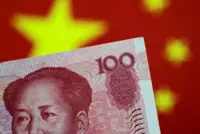SINGAPORE: A relentless decline in the dollar is putting pressure on earnings of Asian exporters, pushing some to consider moves such as renegotiating sales contracts, but it has also created a buffer against rising raw material and foreign debt costs.
Having endured the dollar's 10 percent decline against major world currencies in 2017, exporting firms, such as Japanese and Thai automakers, South Korean electronics and technology firms and Chinese chip makers, are readying for further gains in their currencies.
South Korea's won is already at a 3-year high against the dollar, China's yuan at its highest in two years and the Japanese yen has scaled 110-per-dollar.
At Japan's Nissan Motor Corporation, every one point move in the yen-dollar exchange rate hits operating profit by 17 billion yen ($154.8 million). The company has assumed an average dollar/yen rate of 108 for the 2017 fiscal year, which ends this March.
"Our overall expectation for the 2017 fiscal year is that FX will negatively impact our operating profit by 60 billion yen, across all currencies, not just dollar," said Nick Maxfield of Nissan's communications department.
South Korea’s SK Hynix, the world’s second-biggest memory chip maker, said a 10 percent drop in the dollar versus the Korean won could cause the firm to take a hit of about 300 billion won ($280.6 million) through its dollar-denominated foreign assets.
An official from the silicon industry branch of the China Nonferrous Metals Industry Association, which is responsible for over 200 silicon firms, said long-term overseas orders that Chinese traders had signed last year had become less lucrative because of the weakening dollar and due to rising costs from tighter domestic environmental protection policies.
"This has put pressure on traders and is causing profit margins to gradually shrink," he said, noting China accounts for more than 70 percent of global silicon volumes.
"People won't be making money...and so, to survive, they may take the risk of evading taxes."
In Thailand, the regional production and export hub for the world's top carmakers, a strong baht has added to the burden from a drop in Middle Eastern vehicle demand.
"The strong baht impacts our profits so we have had to undertake cost management measures, such as negotiating with buyers," said Chatchai Taveesakulvadchara, executive vice president at Toyota Motor Thailand, which commands a third of the domestic market.
GLASS HALF FULL
But a weaker dollar environment is not all bad news with local currency strength due in large part to robust demand for Asian-made goods and a broad-based global economic recovery.
Strong domestic consumption also remains a significant help for manufacturers.
Toyota, for example, expects its Thai sales to rise nearly 25 percent this year.
Under such conditions, policymakers remain sanguine about firmer Asian currencies.
South Korea and Thailand have both said they will leave currency rates to market forces, and intervene only to contain volatility.
Earlier this month, China's central bank tweaked its exchange rate settings to allow the yuan to align more closely with the currencies of its trading partners. The yuan rose about 6.5 percent against the dollar in 2017.
A weaker dollar also supports local purchasing power, a boon for both consumers and manufacturers.
For some businesses, the strength in local currencies helps offset higher costs of imported raw materials and their foreign debt payments.
Japan's Nippon Paper, for instance, said the value of its raw material imports exceeds that of its exports so a weaker U.S. dollar would normally be positive for the company.
A one point rise in the yen against the dollar, therefore, would roughly equate to a 200 million yen earnings boost over a six-month period, a Nippon Paper spokeswoman said.
Both LG Display, an Apple supplier, and Korea's Hyundai Motor say a weak dollar affects exports but also reduces the costs of servicing foreign debt.
"The strengthening won has a negative aspect on overseas sales but at the same time an effect in reducing the won-converted amount of foreign currency debt," a Hyundai Motor spokeswoman said in an email reply to Reuters. - Reuters





